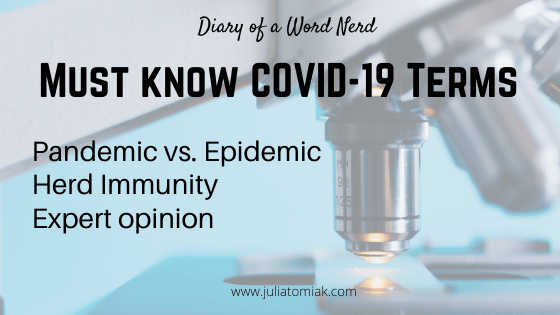As the Coronavirus pandemic continues, we are having more discussions in our house about the terms used to discuss it. This week, we’ve tackled the difference between epidemic and pandemic and an explanation of herd immunity. We’ve also had serious discussion about bias and the importance of evaluating fact versus opinion, as there are many loud voices out there touting opinion as fact, and now is NOT the time to confuse the two.
So, from my Word Nerd home to yours, some critical terms for the “time of corona”.
Epidemic vs Pandemic
As I explained in my first post on pandemic terms, a pandemic is an outbreak of disease that covers a wide geographic area and affects a significant proportion of the population. It is usually used to describe disease from new or novel bacteria or viruses and/or those that spread quickly. Pandemic comes from the Greek pan (meaning “all”) and demos (meaning people, district, country).
Epidemic comes from the Greek epi (at, or on) + demos (people, district, country), and it describes an outbreak of disease that spreads quickly and affects many people at the same time, but is usually contained in one region, state, or country.
To compare the two terms, pandemic has increased scope and coverage than an epidemic. It’s basically a worse form of an epidemic, however there is no clear line between the two. Epidemic is used more often than pandemic in a broad, non-medical sense. (e.g., overuse injuries have become an epidemic among high school athletes)
To learn more about the words epidemic and pandemic, visit Merriam-Webster.
Herd immunity
As talks begin about how to “return to normal” after the pandemic, I’ve been hearing a lot about the need for vaccines and the concept of herd immunity. Herd immunity occurs when so many people in a population become immune to a disease that it stops the spread of that disease. If one person susceptible to disease is surrounded by people who are immune, it is unlikely that vulnerable person will get the disease.
Herd immunity is achieved two ways. The first comes with natural immunity, when a large number of people in a population are exposed to a disease and develop antibodies to fight it. This process requires significant exposure and time, and people involved may or may not show symptoms of disease. The second way occurs when enough people within a population are vaccinated against the disease.
Herd immunity is different for each disease and is influenced by how quickly a disease spreads. Currently, we cannot use herd immunity to stop the spread of COVID-19 because:
- There isn’t a vaccine for COVID-19 yet, and probably won’t be for about a year
- It would take a very long time for populations to develop natural immunity to COVID-19
- Scientists don’t know if you can develop disease from COVID-19 more than once
- Some patients experience serious side effects with COVID-19, and doctors are not sure why some people are more vulnerable
- Some severe cases lead to death
- Hospitals may get overwhelmed by high numbers of cases
For more helpful information about herd immunity, see this Healthline article on herd immunity and this piece by Dr. Eduardo Sanchez, American Heart Association Chief Medical Officer for Prevention.
Expert opinion
We’re hearing a lot of opinions on the possible course of COVID-19, how best to combat its spread, and when it might be safe to ease protective measures. Sadly, the advice we hear is often conflicting and confusing, and we have so many “experts”, it’s hard to know who to trust. One friend asked me, what exactly is medical opinion and how does it differ from other opinions?
According to Dictionary.com, opinion can mean A LOT of things (Emphasis added):
- a belief or judgment that rests on grounds insufficient to produce complete certainty
- a personal view, attitude, or appraisal
- the formal expression of a professional judgment: to ask for a second medical opinion.
- Law. the formal statement by a judge or court of the reasoning and the principles of law used in reaching a decision of a case
- a judgment or estimate of a person or thing with respect to character, merit, etc.: to forfeit someone’s good opinion
- a favorable estimate; esteem:
According to USLegal.com, medical opinion is defined as “statements from physicians and psychologists or other acceptable medical sources. The opinion of a treating physician should be afforded substantial weight in a court case.”
The Code of Ethics of the American Medical Association lists specific guidelines for how a physician should testify in a court case. Physicians must ensure their testimony:
- Reflects current scientific thought and standards of care that have gained acceptance among peers in the relevant field.
- Appropriately characterizes the theory on which testimony is based if the theory is not widely accepted in the profession.
- Considers standards that prevailed at the time the event under review occurred when testifying about a standard of care.
These guidelines apply to a very specific situation – testifying in court about a medical case they were involved with- however, I imagine these could also be used to characterize the statements of opinion given by physicians in an official capacity.
Speaking of official experts and their opinions, you should know:
- According to the Office of Health and Human Services, the Surgeon General is responsible for providing Americans with “the best scientific information available on how to improve their health and reduce the risk of illness and injury.” Our current Surgeon General is VADM Jerome M. Adams, M.D., M.P.H. and his motto is “better health through better partnerships”.
- The National Institute of Allergy and Infectious Diseases (NIAID) is a part of the National Institute of Health, and its mission is “leading research to understand, treat, and prevent infectious, immunologic, and allergic diseases”. The current director of NIAID is Anthony Fauci, MD. He was appointed in 1984 and has advised six presidents on issues about domestic and global health concerns. He also has extensive research experience with respiratory infections, infectious disease, and emerging diseases.
- The Centers for Disease Control and Prevention has a mission to “to protect America from health, safety and security threats, both foreign and in the U.S.” and it has extensive information about COVID-19 on its webpage. It is currently directed by Robert R. Redfield, MD.
I believe the medical opinion of these people deserves our trust during this unusual time.

If you like to learn new words and the origins of their meanings, visit the Wondrous Words Wednesday meme at Bermuda Onion. Each Wednesday, bloggers share new words they’ve learned.
What other COVID-19 terms are you curious about? How do you filter out all of the conflicting opinions in the media these days?
Thanks for getting nerdy with me!




We’ve been learning a lot of things I’d rather not know during all of this, haven’t we? It’s gotten so I don’t know who to believe.
Yes, Kathy, I feel the same way. I’m hoping we, as a society, will be able to learn something besides just vocab from this experience and will emerge better for it. Thanks for visiting!